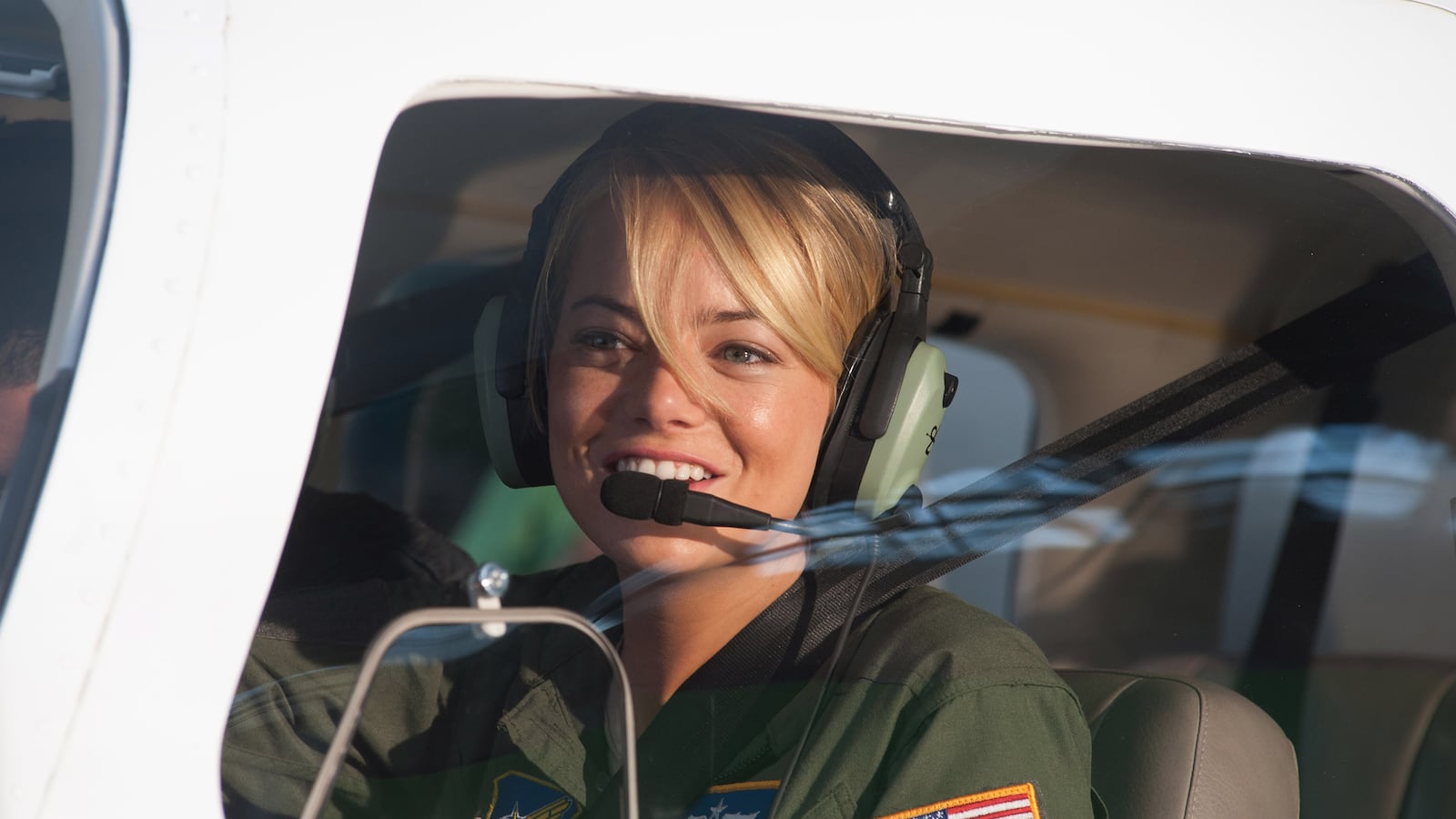Sifting through the fallout from Sony’s race-bending bomb Aloha, Cameron Crowe said Tuesday he was sorry for casting Emma Stone as a Hawaiian fighter pilot of mixed descent named Allison Ng.
Well, more like sorry-not sorry.
“I have heard your words and your disappointment, and I offer you a heart-felt apology to all who felt this was an odd or misguided casting choice,” he wrote on his website The Uncool, calling his Hawaii-set dramedy “misunderstood.”
As detailed in internal Sony emails exposed during last December’s hack, Aloha’s been egregiously misunderstood from the start—by the studio, by star Bradley Cooper, and by others who expressed real concern through its production that the then-Untitled Cameron Crowe Film was already off the rails.
The plot made no sense, for starters; even Amy Pascal noted that “it never … Not even once … ever works.” The romance didn’t go over. Neither did the fact that Cooper’s d-bag military contractor hero was pining after a married woman, or that he was involved in a nonsensical scheme to get a military base gate blessed by natives because nuclear weapons in space, etc.
The studio’s greatest creative minds couldn’t agree on a title that wasn’t either cheesy or terrible, settling for one that pissed off Hawaiians anyway for appropriating an all but sacred word in the name of a snappy marketing campaign.
But in Aloha’s many years of development, production, and completion, nobody involved seemed to even consider that casting the very talented and very Caucasian-looking Emma Stone as a mysticism-spouting Chinese-Hawaiian-Swedish fighter pilot would turn her into the year’s most controversial manic pixie poster child for everything that’s wrong in white male-dominated Hollywood.
Aloha’s issues don’t just lie in the tone-deaf casting of one character. They’re also in the writing of said character. The exploitation of an “exotic” culture as set dressing. The failure of multiple parties around Crowe—stars, producers, studio suits side-eyeing the film from their boardrooms and test screenings—who didn’t see any of the above as problematic, or say so long before the shit hit the fan.
“As far back as 2007, Captain Allison Ng was written to be a super-proud one-quarter Hawaiian who was frustrated that, by all outward appearances, she looked nothing like one,” Crowe explained in his mea culpa post (emphasis his). “A half-Chinese father was meant to show the surprising mix of cultures often prevalent in Hawaii.”
“Extremely proud of her unlikely heritage,”—emphasis mine—“she feels personally compelled to over-explain every chance she gets.”
“The character was based on a real-life, red-headed local who did just that,” Crowe continued, praising Stone’s “tireless research” for the role. “Whether that story point felt hurtful or humorous has been, of course, the topic of much discussion.”
Media types didn’t get to ask Stone much about her “tireless research” in preparing for the wide-eyed, quirky native girl with a deep spiritual connection to the land and people of Hawaii, because most of Aloha’s talent bowed out of doing press ahead of the film’s release. Maybe it’s better this way; nobody wants to hate on Emma Stone, America’s down-to-Earth cool girl sweetheart.
Even Sony halfheartedly attempted to quell the firestorms of controversy. Opening Aloha last week amid scathing reviews, they defended Crowe, pointing to “years researching this project and many months on location in Hawaii.”
In his heartfelt “apology,” Crowe also made sure to toot his own horn for providing the Hawaiian film industry “with many jobs for over four months.” He’s also proud of casting Hawaiian nationalist Dennis “Bumpy” Kanahele as himself in a pivotal and curious role, in which the local leader trades away his people’s blessing to enable a U.S. government rocket launch.
Nobody’s doubting that Cameron Crowe meant well. Generally speaking, he’s an auteur who specializes in meaning well, wearing his heart on his sleeve in tale after tale of redemption for white jerks. He clearly spent time location scouting beautiful Oahu, buddied up to Kanahele, and noticed that complex identity issues drive his one redheaded Hawaiian pal to overcompensate for her perceived ethnicity—and isn’t that humorous?
What Crowe misses in his apology is that audiences might have been more receptive to a hapa haole Emma Stone if she wasn’t playing the only major Asian-American/Pacific Islander character in a cast full of white stars, in a movie set in a state where Caucasians are a 30 percent minority.
Could the characters played by Rachel McAdams, Alec Baldwin, Danny McBride, John Krasinski, Bill Murray, Bill Camp, Michael Chernus, Edi Gathegi, or Ivana Milicevic have been cast with actors more representative of modern Hawaii’s ethnic diversity?
“This comes in a long line of films—The Descendants, 50 First Dates, Blue Crush, Pearl Harbor—that uses Hawaii for its exotic backdrop but goes out of its way to exclude the very people who live there. It’s an insult to the diverse culture and fabric of Hawaii,” wrote MANAA President Guy Aoki, nailing it on the head.
“I am grateful for the dialogue,” Crowe wrote in his apology post, which was ironically published with the comments turned off. “And from the many voices, loud and small, I have learned something very inspiring. So many of us are hungry for stories with more racial diversity, more truth in representation, and I am anxious to help tell those stories in the future.”
We’ll believe it when we see it.





